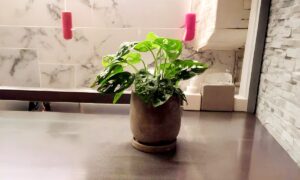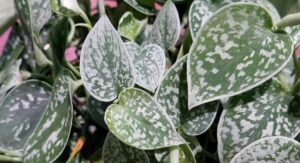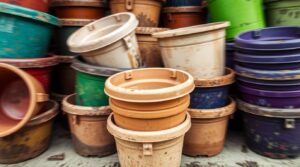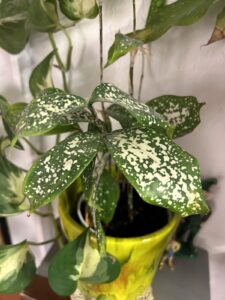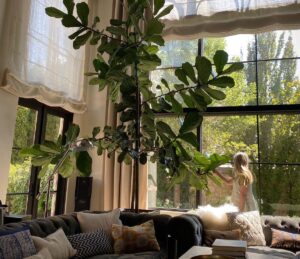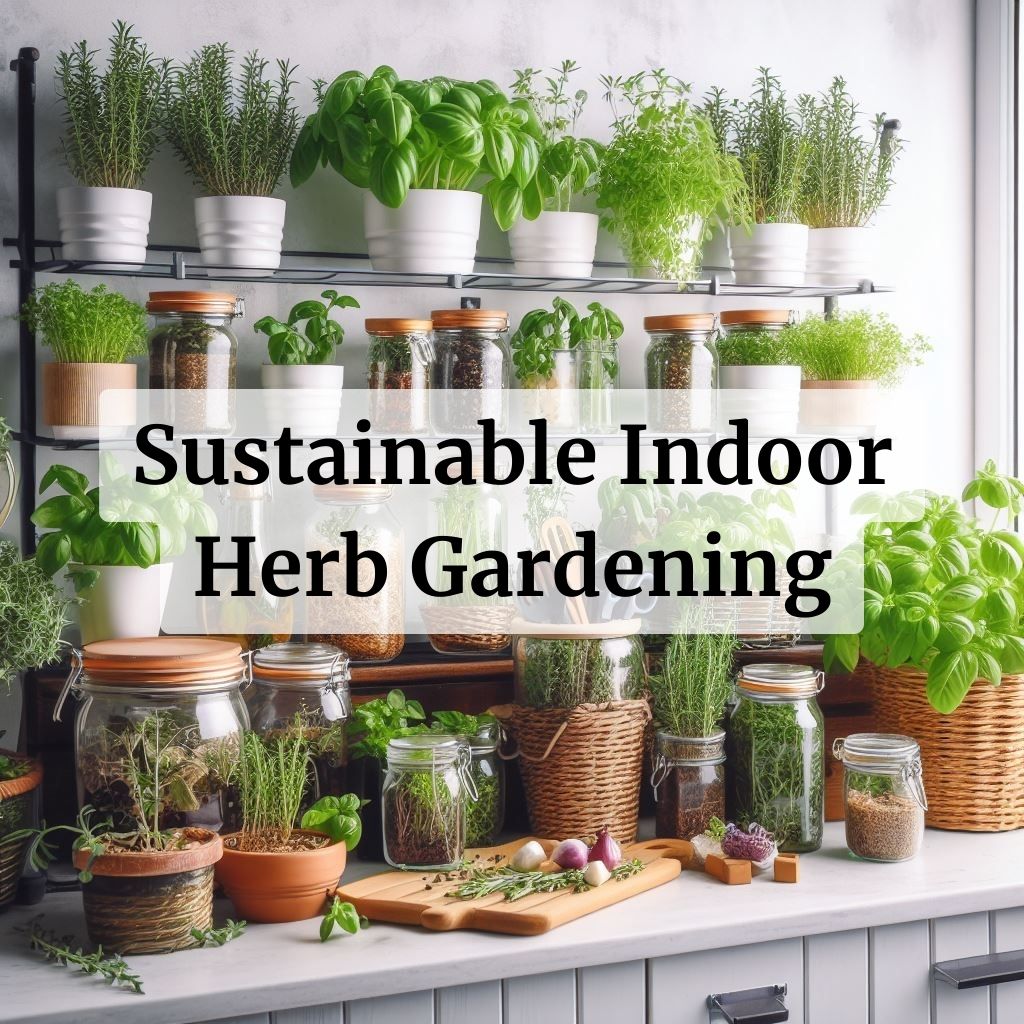
Discover the world of sustainable indoor herb gardening and how it can transform your home. Unearth the secrets of eco-friendly herb cultivation that’s kind to the environment and your taste buds.
In our modern world, sustainability is no longer a buzzword; it’s a way of life. And your indoor herb garden is the perfect place to start. Here’s how you can transform your home into a green oasis:
In this article
Creating a Green Oasis
🌿 “Growing herbs indoors is more than a trend; it’s a way of nurturing the environment and your home simultaneously. Let’s dig in!”
Herb Selection: Mixing the Best for Sustainability
When it comes to herb selection for your indoor garden, sustainability is more than just a buzzword; it’s a guiding principle. To cultivate a sustainable indoor herb garden, consider these key points:
Choosing Herbs Suited to Your Climate and Indoor Conditions:
Selecting herbs that are well-suited to your local climate and indoor environment is essential. For instance, if you live in a dry climate, you might opt for herbs like rosemary, thyme, or lavender, which thrive in drier conditions. Conversely, if you have a more humid indoor environment, basil, mint, and chives may be better choices.
Opting for Perennial Herbs:
Perennial herbs are your ticket to sustainability. These hardy plants can thrive year after year, reducing the need for replanting and the associated waste. Herbs like oregano, sage, and chives are excellent examples of perennial herbs that are relatively easy to maintain.
Using Heirloom Seeds for Biodiversity:
To maintain biodiversity and protect the genetic heritage of herbs, consider using heirloom seeds. These are open-pollinated, non-hybrid seeds that preserve the unique characteristics of each herb. By cultivating heirloom herbs, you contribute to the preservation of diverse herb varieties while promoting sustainable gardening practices.
Container Wisdom: Reduce, Reuse, Recycle
Containers play a crucial role in sustainable indoor herb gardening. Here’s how to make wise choices and reduce your environmental footprint:
Repurposing Containers Creatively:
Instead of purchasing new pots and containers, think creatively about how you can repurpose items you already have. Mason jars, tin cans, old boots, or wooden crates can make charming and eco-friendly homes for your herbs. Not only does this breathe new life into old objects, but it also reduces waste by reusing items that might otherwise end up in landfills.
Selecting Eco-Friendly, Biodegradable Pots:
When you do opt for new containers, consider choosing biodegradable pots made from materials like coconut coir, peat, or compressed paper. These pots break down naturally, reducing the need for plastic and promoting sustainability.
The Fun and Sustainability of Upcycling:
Upcycling is more than just an eco-conscious choice; it’s an opportunity to let your creativity shine. Transform old teacups into herb planters, paint and decorate used tin cans, or breathe new life into worn-out rain boots by turning them into whimsical herb gardens. The process of upcycling is not only fun but also reduces the demand for new products and the waste associated with them.
Organic Love: Feed Your Herbs Right
Nourishing your herbs with care is a cornerstone of sustainable indoor gardening. Here’s how to provide your herbs with the organic love they need:
Using Natural Fertilizers and Compost:
For a sustainable approach to feeding your herbs, opt for natural fertilizers like compost or organic plant food. Composting kitchen scraps, such as vegetable peels and coffee grounds, is an eco-friendly way to enrich your soil. This not only reduces waste but also provides nutrient-rich soil for your herbs.
Avoiding Synthetic Pesticides:
Steer clear of synthetic pesticides that can harm both your herbs and the environment. Instead, embrace natural pest control methods. For instance, you can introduce ladybugs, which are natural predators of aphids, or use neem oil to deter common herb garden pests. By avoiding harmful chemicals, you maintain the health and sustainability of your indoor herb garden.
Sunlight Strategy: Maximizing Natural Light
Proper sunlight management is essential for a thriving indoor herb garden. Here’s how to make the most of natural light:
Positioning Your Herb Garden for Ample Sunlight:
Placing your indoor herb garden near a south-facing window is key to ensuring your herbs receive an adequate amount of sunlight. South-facing windows typically offer the most direct sunlight throughout the day, providing your herbs with the energy they need to grow and thrive.
Using Reflective Materials:
If your indoor space doesn’t receive as much natural light as you’d like, consider using reflective materials strategically. Placing mirrors or light-colored surfaces near your herbs can help bounce available light onto your plants, making the most of what you have.
Embracing LED Grow Lights:
In situations where natural light is limited, LED grow lights are a sustainable solution. These energy-efficient lights provide the specific spectrum of light that plants need for photosynthesis, promoting healthy growth without excessive energy consumption. LED grow lights are an eco-friendly choice for supplementing your herb garden’s lighting needs.
Water Wisdom: Conserve H2O
Water conservation is a significant component of sustainable indoor herb gardening. Here’s how to be mindful of your water usage:
Collecting Rainwater for Herb Watering:
A sustainable approach to watering your herbs is to collect rainwater. Set up rain barrels to capture and store rainwater for later use. This not only reduces the demand on your local water supply but also ensures your herbs receive natural, chemical-free hydration.
Careful Herb Watering Practices:
To avoid overusing water, water your herbs with care. Herbs generally prefer slightly drier conditions, so be sure not to overwater. Always check the soil moisture before watering, and adjust your watering schedule accordingly.
Implementing Drip Irrigation for Efficiency:
For larger indoor herb gardens, consider implementing a drip irrigation system. Drip irrigation is an efficient method that delivers water directly to the plant roots, minimizing water wastage and promoting sustainability in your gardening practices.
The Impact on Sustainability
Your indoor herb garden is a small but impactful step towards a sustainable lifestyle. Here’s how it all ties together:
Reducing Food Miles:
When you grow your herbs indoors, you’re taking an impactful step towards reducing food miles. Imagine the typical journey of store-bought herbs: they are grown in a distant location, harvested, packaged, transported across the country or even internationally, and finally reach your local grocery store. By cultivating your herbs at home, you significantly shrink the distance your food travels. This simple act of reducing food miles is a powerful way to lower your carbon footprint. Your herbs no longer have to endure long transportation routes or contribute to the emissions associated with shipping, making your indoor herb garden an environmentally conscious choice
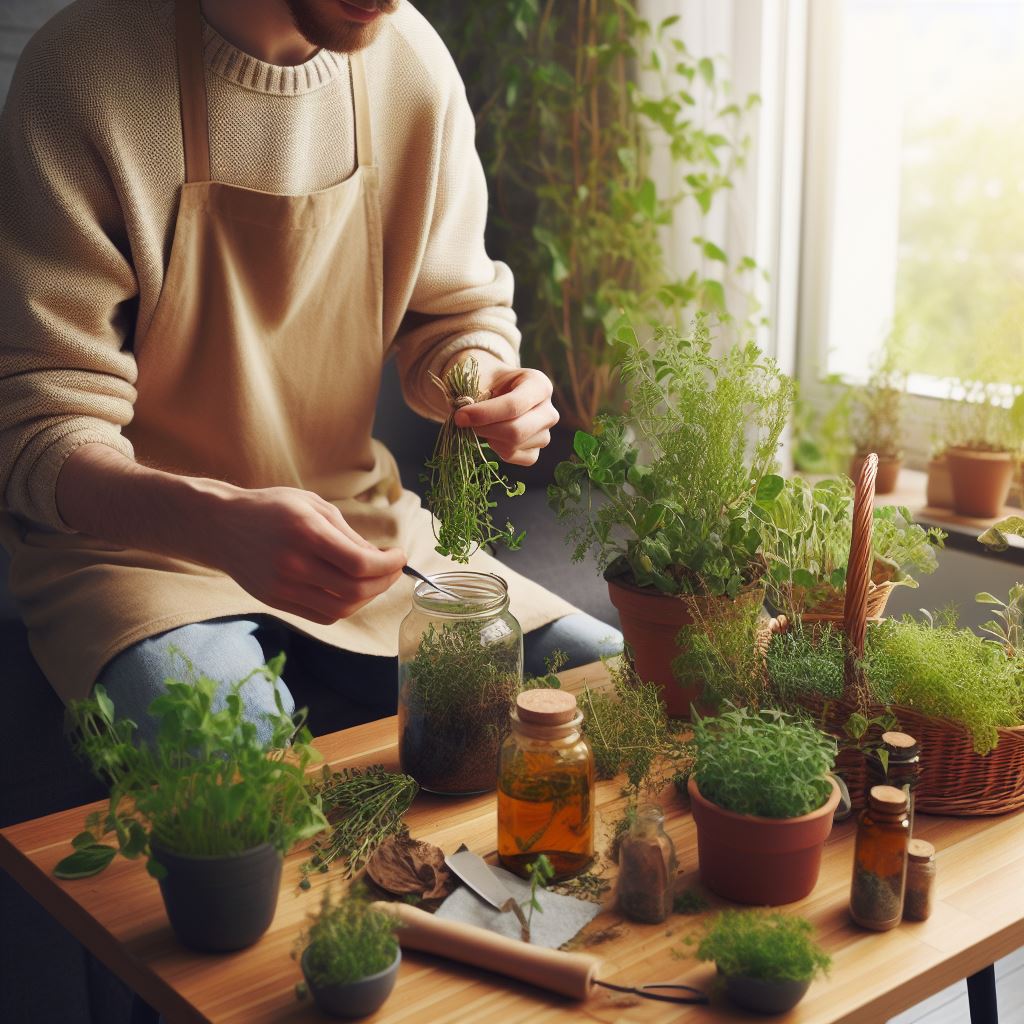
Minimizing Food Waste:
One of the striking advantages of indoor herb gardening is the ability to harvest only what you need. This practice not only ensures that you have the freshest herbs available for your culinary creations but also minimizes food waste. Think about those store-bought herbs in plastic packaging that often go unused and spoil in the fridge. By harvesting herbs as you need them, you reduce waste both at home and in the grocery store. Your indoor garden provides a continuous supply of fresh herbs, reducing the need for over-purchasing and the associated waste of unused produce.
Biodiversity Matters:
Preserving plant diversity is vital for a resilient and sustainable ecosystem. Your choice of heirloom seeds and the careful selection of herbs contribute to maintaining biodiversity. Heirloom seeds are open-pollinated and true to their genetic heritage, ensuring that the unique characteristics of each herb variety are preserved. By growing a variety of herbs, you play a role in promoting plant diversity, which is essential for a resilient and adaptable ecosystem. A wide range of herbs also provides food and habitat for beneficial insects, contributing to a healthier environment for your indoor garden.
Clean Eating:
When you pluck herbs from your indoor garden, you’re embracing clean eating practices. Unlike store-bought herbs that may be treated with pesticides, herbicides, or other chemicals, your homegrown herbs are free from harmful substances. This means you can enjoy the flavors and nutritional benefits of fresh, chemical-free herbs. Clean eating isn’t just about the absence of harmful chemicals; it’s about promoting a healthier lifestyle by making conscious choices about the quality and source of your food. Your indoor herb garden allows you to take control of what you put on your plate and into your body.
Eco-Friendly Containers:
Upcycling containers in your indoor herb garden isn’t just about creativity; it’s also a sustainable choice that reduces the need for new resources and minimizes landfill waste. When you transform old teacups into herb planters or repurpose tin cans into charming herb containers, you’re giving new life to objects that might otherwise end up in a landfill. By choosing eco-friendly and biodegradable pots, you contribute to a circular economy where resources are conserved and reused. This eco-conscious approach reduces the environmental impact of herb gardening and supports the ethos of sustainability.
Sustainable Water Use:
Water conservation is a significant aspect of sustainable indoor herb gardening. By collecting rainwater for herb watering, you’re making efficient use of a natural resource while minimizing the demand on your local water supply. This practice not only helps to conserve water but also ensures that your herbs receive pure, chemical-free hydration. Implementing a drip irrigation system further enhances water efficiency, delivering water directly to the roots of your herbs and reducing the risk of overwatering. By being mindful of your water usage, you contribute to sustainable water management and conservation in your indoor herb garde
Sustainable indoor herb gardening is not just about growing herbs; it’s about cultivating a greener lifestyle. Your choices, from herb selection to container creativity, organic care, sunlight management, and water conservation, all contribute to a more sustainable and environmentally friendly way of nurturing your indoor herb garden.
In the world of indoor herb gardening, sustainability is the key to a greener, healthier future. Your efforts, however small they may seem, contribute to a larger movement of eco-conscious living. So, keep tending to your indoor herb garden, nurture the environment, and savor the delicious, fresh flavors it provides.
Herb gardening isn’t just about the plants; it’s about nurturing a sustainable, interconnected world right from the comfort of your own home.
🌱 “Now, it’s your turn to create a green oasis in your home, one herb at a time!
Frequently Asked Questions:
Can I grow herbs indoors even if I don’t have a green thumb?
Absolutely! Indoor herb gardening is beginner-friendly and a great way to start your gardening journey.
What herbs are best for indoor gardening?
Herbs like basil, mint, rosemary, thyme, and oregano are excellent choices for indoor cultivation.
How can I keep pests away from my indoor herb garden without using harmful chemicals?
You can use natural methods like neem oil, companion planting, or even placing herbs like lavender or marigold nearby to deter pests.
Can I grow herbs indoors if I live in a small apartment with limited space?
Yes! There are plenty of space-saving and vertical gardening solutions that work well for indoor herb gardens in small spaces.

